Is Social Media Making or Breaking Minds? A Deep Dive by InvestorWeeklyNews
In today’s world, social media is no longer just a digital pastime — it is a powerful force shaping thought patterns, social behavior, emotions, and even mental health. It influences elections, launches careers, fuels revolutions, and simultaneously, leaves many questioning their self-worth. As its grip on daily life grows stronger, the question becomes increasingly urgent: Is social media making us more connected and informed, or more anxious and fractured?
InvestorWeeklyNews explores the layered impact of social media on the human mind — both the positive innovations and the darker, less discussed consequences.
The Allure of Connectivity
At its core, social media was built on the promise of connection. Facebook encouraged us to reconnect with old friends. Twitter positioned itself as a space for global conversation. Instagram made visual storytelling personal. TikTok brought global creativity to everyone’s fingertips.
This connectivity has produced remarkable outcomes. Families separated by borders stay in touch. Activists organize across time zones. Artists, writers, and entrepreneurs find audiences without needing mainstream platforms. Social media has democratized voice and visibility.
But with every ping, like, or share comes a subtle psychological effect. These small digital affirmations begin to shape how we view ourselves — not through intrinsic worth, but through external validation.
The Dopamine Loop: A Digital Addiction
One of the more concerning aspects of social media use lies in how platforms are designed. Algorithms are not built to make users happy; they are built to keep users engaged. That means more scrolling, more likes, more content — often at the cost of mental well-being.
The “infinite scroll” function triggers the brain’s reward system. Each like, comment, or notification releases dopamine, a neurotransmitter that plays a major role in how we feel pleasure. Over time, the brain begins to crave this stimulus, much like it does with gambling or substances. The line between habit and addiction starts to blur.
Many psychologists now point to social media dependency as a modern behavioral addiction. And unlike other addictions, this one is socially accepted — even encouraged.
Curated Lives vs. Real Lives
One of the greatest psychological pressures of social media comes from comparison. Platforms like Instagram and Snapchat showcase polished, filtered, and edited versions of people’s lives. Vacations, bodies, relationships, and achievements are displayed in highlight reels, not as messy realities.
For many users — especially teens and young adults — this creates a distorted perception of what a “normal” life looks like. When your everyday struggles are compared to someone else’s best moments, it breeds insecurity, anxiety, and a sense of inadequacy.
Research from various institutions has confirmed links between social media use and increased levels of depression, especially among adolescents. Body image issues, cyberbullying, and fear of missing out (FOMO) all play significant roles.
Echo Chambers and Mental Rigidity
Social media doesn’t just affect how people feel about themselves — it also shapes how they think about the world. Algorithms often feed users content similar to what they already consume. This can result in echo chambers, where people only see opinions, news, and perspectives that match their own.
Such narrowing of exposure can lead to confirmation bias, political polarization, and intellectual rigidity. When disagreement becomes rare or hostile, open-mindedness suffers. This doesn’t just limit personal growth — it endangers democratic discourse and shared understanding.
What’s more, misinformation and emotionally charged content spread faster than reasoned dialogue. This fuels collective anxiety and erodes trust in institutions, science, and even truth itself.
The Rise of Digital Burnout
Another emerging consequence of constant connectivity is digital fatigue. The endless loop of updates, notifications, content, and engagement can become overwhelming. Many people report feeling mentally drained, emotionally numb, or perpetually distracted.
Digital burnout is particularly pronounced among content creators and influencers who feel pressure to remain relevant. The demand to produce fresh, engaging content daily — while managing public perception — can lead to anxiety, sleep issues, and emotional exhaustion.
Even casual users are not immune. The expectation to respond quickly, stay updated, and maintain an attractive online presence adds invisible pressure that chips away at mental clarity and peace.
Social Movements and Empathy Amplified
Despite its drawbacks, social media is not all negative. One of its most empowering functions is its ability to bring social issues to the forefront. Movements like #MeToo, #BlackLivesMatter, and #ClimateStrike gained global momentum because of digital visibility.
These platforms give voice to the voiceless, highlight injustice, and create communities of shared struggle. Survivors of abuse, victims of discrimination, and marginalized groups have used social media to share their stories, seek support, and drive real-world change.
This aspect of social media proves that the platforms themselves are not inherently harmful. It is how they are used — and how they are designed — that determines their effect on mental health and collective consciousness.
Youth and Identity Formation
For younger generations, social media plays a key role in identity development. Teenagers and young adults often use digital platforms to explore who they are, what they believe, and how they want to be seen. This can be both liberating and risky.
On the one hand, it allows experimentation and connection with like-minded peers. On the other, it exposes young minds to harsh criticism, bullying, unrealistic standards, and online predators. The developmental consequences of this exposure are still being studied, but early research suggests both cognitive strain and emotional vulnerability are elevated among heavy users.
Parents, educators, and policymakers are now questioning how to guide young people in balancing digital expression with psychological resilience.
The Corporate Role in Mental Health
Technology companies are not passive actors. They make deliberate decisions about how social media works — what is rewarded, what is shown, and how users are tracked. These decisions have direct consequences on mental health outcomes.
While some companies have introduced features like time limits, well-being prompts, and screen usage reports, critics argue that these changes are cosmetic. The business model still depends on user attention and data extraction. As long as engagement is monetized, there is little incentive to reduce it.
Some mental health advocates are calling for regulation — not just of content, but of design. Ethical technology, they argue, must prioritize user well-being over ad revenue.
Reclaiming the Mind: What Can Be Done?
Social media is here to stay, but that doesn’t mean users must be controlled by it. There are practical steps individuals can take to protect their mental health:
- Set intentional time limits for app usage
- Curate your feed to follow accounts that promote balance, insight, and positivity
- Take regular digital detoxes — even short breaks help recalibrate the mind
- Be critical of comparisons — remember that what you see is not the full picture
- Engage mindfully — ask whether a post brings value, or just noise
- Seek help when needed — mental health should never be a silent struggle
More broadly, education on digital literacy and emotional intelligence is vital. Schools and workplaces should incorporate media awareness programs that teach users how to navigate the psychological effects of online life.
Final Reflections
The impact of social media on the mind is neither fully good nor entirely bad. It is a complex, evolving phenomenon that mirrors the best and worst of human nature. It offers connection, creativity, and opportunity. But it also demands attention, fosters comparison, and can corrode well-being when left unchecked.
At InvestorWeeklyNews, we believe the future of social media depends on conscious design and informed usage. The platform itself is a tool — its true power lies in how we choose to wield it.
In an era where minds are more connected than ever, it is time we also prioritize how they are protected. Because the health of our digital lives will shape the health of our real lives — for generations to come.





